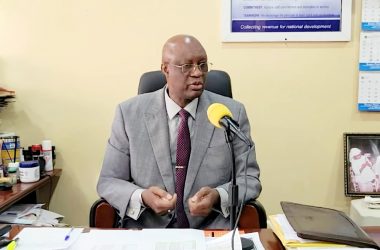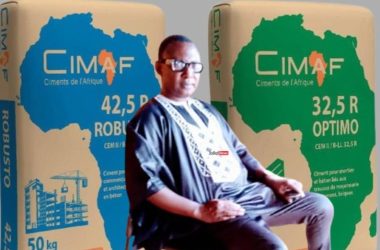
An International Monetary Fund (IMF) staff team, led by Jaroslaw Wieczorek, visited Banjul from February 25–March 8, 2019. The team discussed economic and financial policy commitments under a new Staff-Monitored Program (SMP) for 2019.
At the end of the visit, Mr. Wieczorek said: “The team reached understandings with the Gambian authorities on a new Staff-Monitored Program. Upon the completion of prior actions, the program is expected to be submitted to the IMF Management for approval by end-April. In this context, the team commends the authorities for their commitment to strengthening fiscal performance and consolidating recent macroeconomic gains.
“The Gambia’s economic recovery has continued to gather momentum, underpinned by a resurgence in business confidence. In 2018, real GDP grew by an estimated 6.6 percent, up from 4.6 percent a year earlier. Headline inflation declined from 6.9 percent at end-2017 to 6.1 percent in January 2019. The improved inflation outlook paved the way for an easing of monetary conditions and spurred a strong recovery in private sector credit. Robust growth in tourism and remittances helped stabilize the dalasi and facilitated the accumulation of gross official reserves, which reached US$195 million at end-January 2019 (or about 3 months of prospective imports).
“Budget execution in 2018 faced implementation challenges, which led to the postponement of budget support equivalent to 3 percent of GDP. Domestic revenue performance improved, bolstered by strong domestic activity and import growth; however, expenditure slippages in various areas and fiscal pressures from state-owned enterprises contributed to a widening of the fiscal deficit to 6.6 percent of GDP (from 5.3 percent of GDP a year earlier). As a result, recourse to domestic borrowing significantly exceeded the budgeted amount. More encouragingly, important progress was made on the reform agenda, particularly on central bank governance and operations, strengthening treasury management, and preparations for the reform of state-owned enterprises, with the launch of special audits of the largest six.
“The team reached understandings on a reform agenda for 2019 and fiscal measures needed to ensure consistency of 2019 budget implementation with the SMP. With budget support in the form of grants expected to exceed 5½ percent of GDP, the authorities committed to a net domestic borrowing target of zero, with the understanding that strong policy efforts will be needed to maintain fiscal discipline and ensure that all the expected budget support materializes. Revisions in excise rates, user charges and fees, and strengthened revenue administration are expected to boost domestic revenue performance. On the expenditure side, tighter control of public spending and improved financial management of state-owned enterprises are expected to generate savings. In this regard, the team welcomes the authorities’ renewed commitment to reducing the staffing of foreign embassies and creating contingencies in the existing budget envelope, to address fiscal risks from state-owned enterprises.
“The team supports the authorities’ ongoing efforts to restructure The Gambia’s debt and notes that preliminary responses by creditors have been broadly positive. In tandem, the authorities are encouraged to enhance control over external debt contracting, including by state-owned enterprises, and to implement the reforms designed to strengthen their governance and improve their operational efficiency and transparency.
“Staff welcomes the Central Bank of The Gambia’s (CBG) efforts to improve its liquidity management through the introduction of central bank bills. Staff considers the current monetary policy stance appropriate, following the recent easing of the CBG policy rate from 13.5 to 12.5 percent. The CBG should maintain its flexible exchange rate policy, while remaining vigilant about inflation pressures and potential risks to financial stability from the rapid expansion in private sector credit.
“The team met with Minister of Finance and Economic Affairs Njie, Minister of Trade, Industry, Regional Integration and Employment Sanneh, CBG Governor Jammeh, and other senior government and public officials, representatives of the private sector, banks, civil society, development partners, and members of the diplomatic community.
“The team thanks the authorities for their openness, and fruitful and constructive discussions, and looks forward to continuing close cooperation in the period ahead.”






Excerpts:
1. “Revisions in excise rates, user charges and fees, and strengthened revenue administration are expected to boost domestic revenue performance.”
2. ” On the expenditure side, tighter control of public spending and improved financial management of state-owned enterprises are expected to generate savings.”
Observation:
Hidden in this piece of fiction is the real truth about the IMF: to manipulate governments to squeeze every penny from their struggling citizens and hand it over to their (IMF) clients.
By recommending increases in rates, service charges and fees (as indicated in 1.), the IMF ensures that our government raises revenue, not by investing in the productive sectors of the economy, but by scraping the backs of struggling and over burdened populations, who are already living in abject poverty.
And by advising Public Sector spending cuts ( as indicated by 2.), it is obvious that any extra revenue raised by increasing fees, excise rates and user charges will most likely go towards meeting debt repayment obligations.
This is what the IMF is all about. It creates the conditions for total reliance on loans, through its advisory and monitoring role, and acts as the conduit for loans from its shareholders, who reap good rewards from their investment. The more a nation surrenders its sovereignty to the IMF, the more access it has to funds from global financial bodies, which may solve immediate to midterm goals, but are disastrously debilitating in the long term.
I am also very critical of IMF interventions, advisory, stimulus packages etc.
My experience is that one has to put his house in order first before expecting meaningful and “constructive” help from such international donor bodies who are principally beholden to the interests of major donor countries.
Our weakness is the problem. All negotiations we go into are undertaken from a position of weakness. The same handicap afflicted Jawara and Terrible Jammeh.
Our weakness in this particular budgetary situation is the lack of financial discipline. The president has cornered himself into a political situation in which he can only survive by bribing for loyalty and political clout. The aims layed out in the NDP are flouted everyday because the president himself, willing or forced by circumstances, acts in a way that totally distracts and encourage corruption. Every week there is a distraction and waste of State resources in either reacting to these events or to contain them.
IMF knew about these inconsistencies before going into any negotiations. So they come into these meetings from a position of strength.
An acquaintance of mine shipped in a container of goods to The Gambia from Europe in January 2018. The time between the departure of the container until the ship anchored here, the clearing tariffs has gone up more than 25%. Justification from the customs and GRA was that the devil IMF has “discovered” a revenue loophole in the system and they demanded this to be closed forthwith before their delegation leave the country.
No time to inform the end users of this increment. The acquaintance in question has to pass the corresponding cost to his clientele . Well it’s not hard to imagine the business consequences for him.
As Bax mentioned, we should stop borrowing from such white manipulative institutions and develop our own productive base and capacity to consume our own domestic products and export abroad for foreign exchange.
Unfortunately, of all the political parties in The Gambia, PDOIS is the only voice espousing this methodical approach to our economic woes.
Squabbling over ethnolinguistic difference and other mundane issues will not safe us when the enemy strikes. And they have been striking at their convinience since they “discovered” us.
But pdois is also the party shying away from responsibility be it taking a ministerial post or voting against supplementary budget.
Talking or highlighting loopholes, shortcomings etc are important but when the occasion arises, one also must take a responsibility and correct the shortcomings. You cannot be perpetual bystanders!
Pls don’t tell me “godfather” Darboe denied us ministerial positions or he made it impossible to work with him (even though he is not the elected president).
Quote: “PDOIS is also the party shying away from responsibility be it taking ministerial post or voting against supplementary budget.”
Come on Kinteh (Kemo), what are you talking about. I honestly didn’t expect this from you.
For starters, how could you reduce the assumption of responsibility to just holding position in Cabinet or voting against the supplementary? Are you completely disregarding the role that PDOIS politicians play in the various select committees or in their constituencies or don’t you consider that to be responsibility enough?
But let’s talk about the vote for the SAB. If we are going to play the blame game, then perhaps, we need to remind ourselves who controls the majority in the NA. Isn’t it the UDP that has the majority and can defeat or pass any bill or budget if they so wish? So, if you’re going to point fingers, please do so towards the right direction and that’s not towards PDOIS, with just 4/5 NAMs.
If the UDP wanted to defeat the SAB, then they stand guilty of shirking their responsibility, because they have the numbers to do so. PDOIS could not defeat the SAB, even if they rejected it for lack of the numbers needed.
What you seem to forget is that at least one PDOIS NAM voted for the amended SAB (And he’s explained his reasons in a National newspaper), whilst another stuck to his principles of NOT normalising illegality and avoided the process altogether. (I’m not sure about the rest).
As for their absence from Cabinet, you know or you should know that PDOIS Leaders abstained from the Barrow Cabinet, just as they rejected job offers from Jawara and Jammeh and for the same reasons: their idea of governance and programmes to build the country are diametrically opposed to each other. They would have abstained from Ahmad Bah’s Cabinet, if he had won the election as United Front Candidate for the same reasons too.
I can say that PDOIS will NEVER work in the Cabinet of dependent, bankrupt, small scale neoliberal capitalists economies that know no other way than total reliance on borrowing, grants and foreign aid to even maintain their recurrent expenditures.
PDOIS is the most responsible party, with the most responsible and serious politicians our country had ever seen.
The reasons why IMF is the boogeyman is:
Our Gambian way:
1. Corruption
2. Irresponsibility
3. Insincerity
4. Poor Judgment
5. Failure to take ownership of our glaring fiscal failure and initiate remedy
6. Our destructive protective psyche that blame “THEM” for our miserable existence instead of taking collective responsibility and control our own destiny
Think about it, in the last 2 years, if we:
1. Did not steal
2. Did not waste our resources
3. We focused our energy on Agriculture, Education, and Infrastructure
Why will we need IMF?
Of course asking Gambians to think will take a billion years, since we rather waste ink and paper on irrelevant political discussions.
God Bless The Gambia.
Kemo (Kinteh), you got it wrong because you did have your facts straight. If PDOIS would shy away from responsibility, like UDP/Ousainou, there won’t have been a coalition talk less of a coalition government. How quick people forget!
When will you finally put this issue about ministerial post to rest? The agreement was for technocrats to man ministerial positions to allow political figures and parties prepare for the next presidential elections.
But wait till Ousainou come out of jail and start scrambling for power, status, privileges and positions. Tell me, what experience and or qualifications are put into consideration when Omar Jallow, Ahmed Fatty, Henry Gomez, Ahmat Bah, Isatou……took it upon themselves to share ministerial positions amongst themselves like hungry wolves over a carcass. What criterial was used for apportioning the responsibilities?
And above all, what changes and improvements have each and everyone of them brought to their various ministries?
Stop this hypocrisy and focus on the weaknesses of the party/cult leader you so dearly support without reason except the fallacy that it’s the “largest party”. I will advice you to take up responsibility in the UDP because you sometimes make more sense than Ousainou himself. Maybe, just maybe, you would be able to institute some fundamental changes for good.
As it stands, UDP is the emptiest barrel making the biggest noise on the political playing field.
Thinking that our underdevelopment is all orchestrated from the inside is myopic. IMF makes its profits from the interests it charges on loans and other credit facilities. It came into being for the reconstruction of Europe and it still serves the same master (white parasites and vampires) that continue to suck Afrikka’s blood dry. The raped cannot be the perpetrator because he/she could not defend him/herself.
More than half the combined wealth of THEM comes from our blood, our sweat and our tears. If THEM will pay, as they paid the so called Jewish state of Israel, they will be poor for the next ten mellania.
I don’t blame us, we have been conditioned for thousands of years to self-hate. And that manifests itself every time Mwalimu voice his pro blakk stance on this platform.
And the louder shall be my voice.
Take Dr. Sarr’s Point 6. into consideration.
On Darboe, the UDP rank and file believe he is a capable leader. I would need to challenge that with my own bags of accomplishments. Until then, I should respect the majority will in the party.
6. “Our destructive protective psyche that blame “THEM” for our miserable existence instead of taking collective responsibility and control our own destiny”.
_______________________
The most authoritative work done by any academician on the psyche of blakk people is Franz Fanon followed by Dr. Frances Cress Welsing.
Numerous blakk psychologist rely on their work for trauma therapy and other mental ailments for our people.
You will not find a trace of “our destructive protective psyche” in their works. Blakk people as a matter of fact have no such psyche, we are conditioned and forced to view the world through the lenses of white people. Our knowledge of self is all but gone. I refer you to one of Frantz Fanons best books on this subject titled “black skin white mask”.
Second, you have to go back to that sentence and interrogate how “protective” and “destructive” are positioned next to each other to understand the meaning, which is no meaning.
Words are meant to be understood in their proper context. Neurologically, the human brain and the mind are incapable of these two actions (self destruction and self protection) simutenously.
But as I said before, if a people are conditioned over such a long period of time to self-hate and self-harm, they will end up doing just that and at a certain point in time, it becomes nearly impossible to unlearn those lies.
————————————-
You can stick it out with Ousainou. For both your party and the Gambian populace, it will only get worse.
People need to knows that IMF is open for business and they are looking for profits not for free enterprises, every poor nations need to understand that IMF loan always required interest rates. It is every country responsibility to take care of what ever they borrowed. IMF could only rideoff any default loan, if natural disasters happened or disasters beyond controllable. To be candid Africa has a problems of corruption and mis management.
There is no doubt that Africa, like everywhere else, has its problems of corruption and mismanagement and the later (mismanagement) is the bigger of the two, in my view. And this, coupled with total reliance on economic directives from abroad, from institutions like the IMF that do not necessarily have Africa’s interest as a priority, are the real reason for the hopeless situation in the continent.
Let me just use this African country’s example to show why I think so: Malawi.
Between 1998 and 1999, the Malawi government initiated a nationawide programme to give each small holder family a “starter pack” of free fertilisers and seeds, after several years of successful experimentation, working with the poorest families. The result was a national surplus of corn, achieving food self sufficiency in their staple food, a rarity for African countries.
Then came the intervention of the World Bank, IMF and other donor agencies who forced a scaling down and eventual scrapping of the programme, arguing that such practices (subsidies) distorted trade. What followed was a plummeting of food crop output, as a consequence of the lack of free “starter packs”.
To make matters worse, the IMF literally forced Malawi to sell off a large portion of its strategic grain reserves to enable the food reserve agency to settle its commercial debts, and the government complied.
So, with food output down, naturally there followed a yearly shortage that turned into a crisis barely three years after the scrapping of the programme (2001-2002) and without the food reserves (which were sold on IMF advice), the crisis quickly developed into a disaster, leading to the deaths of about 1500 from starvation.
And when the food crisis continued unabated into 2005, under IMF and WB guidance and advice, a new government eventually mustered the courage to end IMF/WB institutuionalized stupidity, reintroduced fertilizer and seeds subsidies and two consecutive years of bumper harvests created a surplus of over ONE MILLION tons of maize, thus turning a food deficient and starving country into a major exporter and supplier of maize to other countries in Southern Africa.
And this achievement is in spite of the fact that Malawi has corruption and mismanagement problems. In fact, the country scored a poorly average of 32 points from a possible 100 for corruption bewteen 1998 and 2018, according to Transparency International. So, there is corruption in that country, but it has not stopped achievement in food self sufficiency, if the right policies were followed.
The lessons: corruption and mismanagement are a huge problem for any country, but the major factor for the state of Africa’s economies, lies, not in corruption and mismanagement, but institutionalized stupidity of our economic advicers and guides:IMF/WB and co.
I know of 3 class of people that take advice from IMF.
1. Imbecile
2. Mad man or
3. A crook
You decide.
One also has to be a certified fool and a big idiot not to take the statements/utterances of US officials at major global events, and relate that to current realities, given the dominant role the US plays in global institutions.
It is reported that at the start of the Uruguay Round of Trade Negotiations in 1986, then US Agriculture Secretary, John Block stated as follows:
“the idea that developing countries should feed themselves is an anachronism from a bygone era. They could better ensure their food security by relying on U.S. agricultural products, which are available, in most cases at lower cost.”
Indeed, US Agricultural products are generally cheaper but this is only due to the subsidies enjoyed by US farmers, a strategy that is denied to developing countries by IMF conditionalities. Today, unfair trade practices and the liberalization of trade (again another favoured IMF recommendation) allows heavily subsidised products from the West to flood the World Market, thus bankrupting producers from third world countries.
If we take The Gambia’s cotton production, as an example, we can see how a once, thriving sector has been driven into near non existence today: from a tonnage of thousands in the late 80’s and 90’s to a mere few hundreds today, mainly due to the offloading of subsidized cotton from the US on the World Market.
Our cotton growers stand no chance against such cheap, heavily subsidized US cotton and the story is repeated in almost all other products from the industrialized countries. It’s heavily subsidized products (from EU, as well) that our farmers’ produce have to compete with on the World Market.
The outcome is a no brainer, hence the sorry state of affairs in our countries.
We CANNOT continue on this trend, if we want to build societies that deliver/guarantee prosperity to our people.